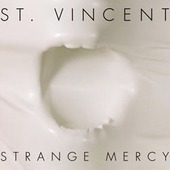
St. Vincent
Strange Mercy
(4AD; 2011)
By Conrad Amenta | 19 September 2011
In the five years since the charming, clever Marry Me (2007) Annie Clark has been elevated to the status of indie darling, so that Strange Mercy is already poised as her breakthrough. It deserves to be, which is important in the sense that it’s a great album—one of the best of the year—but perhaps more importantly also in the sense that it’s an album that holds at arms’ length, and makes the subject of its various neuroses, the very praise it’s positioned to receive.
Despite our tendencies to read autobiography into it, Clark is not the only subject of Clark’s work. There is also the false catharsis that she provides in response to our expectations. She casts herself as equal parts martyr and ironist, duplicitous and all “who, me?” innocence, an actor who is at once petty, self-effacing and wryly critical of the character she’s playing. It’s impossible to know when it’s Clark who is speaking and when it’s St. Vincent, and the sense that something is being confessed only to distract from what is being withheld is felt throughout Strange Mercy. There’s an Uncanny Valley thing going on in her lyrics and in the imagery of her music videos; “Cruel” sees her buried alive by a group of domestic stand-ins while she lies robotically in her grave and waits for the end; her video for “Marrow,” from the tellingly-titled Actor (2009), casts her as the medium for an unspecified but oncoming dread, a caricature maybe even of death itself, who still says “help me” into the camera. When we see her in photographs she’s often being poked and prodded by hands belonging to someone out-of-frame. Hers is a harried persona, an outsider in a beautiful, talented person’s body, perpetually in fear of being misunderstood.
The effect is that when we hear a song like “Cheerleader,” the easy read—that it’s about independence—seems only half the point. Clark doesn’t want to be a cheerleader anymore, but the other half of the story is that she can’t escape it, is “telling whole lies with a half-smile,” has “played dumb when I’ve known better” (and, it’s worth noting, has “seen America with no clothes on”). What Clark sounds like on Strange Mercy is trapped, eaten away at by a mysterious truth she can’t bear or is unwilling to confront us with. We’re not getting to the core of her; we’re getting to the core of these uncomfortable, anxious moments when it seems like Annie Clark doesn’t really like being the center of our, or anyone’s, attention.
The tale’s in the tones: Strange Mercy is Clark’s most tense, nauseous, kaleidoscopic album yet. Anachronistic synths climb through scales without resolving, and her voice hits its highest registers on “Cruel” and “Surgeon”; arrangements are contrapuntal and jagged, going on a couple of prickly bars too long; a song is as likely to break into fuzzed-out pop (“Northern Lights” and “Hysterical Strength”) as it is to ascend through a toothy stutter of jazz guitar and caterwauling (“Surgeon” again). The experience is not cathartic but the sound of obsession and suffocation, as that Frighteners-like cover would imply, sort of the polar opposite of the Polyphonic Spree, with whom Clark once played.
Strings and keys are harmonious but used to unsettle, always employed as a contrast to an emerging noise or playful statement, like “They could take or leave you / So they took you and they left you.” Is that the melody of Leonard Cohen’s “Hallelujah” evoked in the opening to “Champagne Year,” a song that includes lines like “I make a living telling people what they want to hear” (which is, brilliantly, the last thing we’d want to hear) and “It’s not a perfect plan / But it’s the one we’ve got”? Is it coincidence that the term “champagne year” is also used in “Northern Lights,” in which she is “convinced it was the end of times”? I wouldn’t put that kind of juxtaposition past a songwriter of Clark’s intelligence and skill. (“Champagne Year” is, incidentally, probably the most beautiful thing Clark has ever written, all shimmering ambient noise and subtle guitar work beneath a simple coda in an elegant three-and-a-half minutes. It’s appropriate that the closest thing Strange Mercy offers to a healing beauty is preempted two songs earlier with a disavowal.)
The artist whose work Clark’s most reminds me of is the supremely awkward but sincere Mark Oliver Everett of Eels, who, when at his best, knows that to sing something vulnerable or unsettling over something simple is to employ that simplicity to greater effect. Clark’s music isn’t as simple—its veneer of jazz technicality, her wordplay and irony—but Everett and Clark seem to inhabit that same space on the peripheries of what we consider cool: capable of straightforward beauty in the populist vein but almost uncomfortable with that power. Hear in “Year of the Tiger” that it’s both St. Vincent’s time, and a time in which Clark is “living in fear.” Strange Mercy sounds like an anxious document, anathema of the success we wish for Clark to receive. The cover of her first album was a picture of Clark looking directly at the viewer under the title Marry Me. The second had her looking with faux hope out of frame under the title Actor. The third has a mouth, belonging to an obscured person, screaming in claustrophobic terror. The lyrics to “Cruel” hang overhead: “Can’t you see what everybody wants from you? / If you could want that too, then you’ll be happy.”





